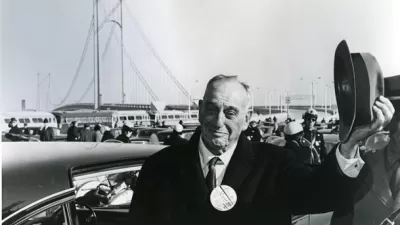Bridge and Tunnel Club has published the full 23-page typed, double-spaced letter that Robert Moses wrote in response to Robert Caro's biography.
You probably won't be surprised to learn that Moses wasn't particularly fond of his portrayal in the Pulitzer prize winning book, The Power Broker. And as you may have guessed, he doesn't hold back in his response to a book "full of mistakes, unsupported charges, nasty, baseless personalities and random haymakers thrown at just about everybody in public life." Moses refutes "personal, nasty, false, venomous and vindictive canards" portrayed in the book (such as his supposed affair with Ruth Pratt) and suggests that third parties "look at the record" as he disputes charges about his professional failings.
"I invite no prolonged controversy with the likes of Caro and his publishers," Moses writes on page 3. "This comment is not meant to spark controversy. It aims to make one statement which will answer ligitimate inquiries. If there were the slightest vestige of truth in the random charge that poor, halpless, displaced persons met ruthless public works dictators who sadistically scattered them to the worst rookerires, why do not Caro and his publisher offer some plausible evidence? Ninety-eight percent of the ghetto folks we moved were given immeasurably better living places at unprecedented cost. Usually a month after the last relocation not a letter of complaint was received."
Here's another gem from page 5-6:
"One can not help being amused by my friends among the media who shout for rails and inveigh against rubber but admit that they live in the suburbs and that their wives are absolutely dependent on motor cars. We live in a motorized civilization."
FULL STORY: Robert Moses' Response to Robert Caro's The Power Broker

Planetizen Federal Action Tracker
A weekly monitor of how Trump’s orders and actions are impacting planners and planning in America.

Maui's Vacation Rental Debate Turns Ugly
Verbal attacks, misinformation campaigns and fistfights plague a high-stakes debate to convert thousands of vacation rentals into long-term housing.

Restaurant Patios Were a Pandemic Win — Why Were They so Hard to Keep?
Social distancing requirements and changes in travel patterns prompted cities to pilot new uses for street and sidewalk space. Then it got complicated.

In California Battle of Housing vs. Environment, Housing Just Won
A new state law significantly limits the power of CEQA, an environmental review law that served as a powerful tool for blocking new development.

Boulder Eliminates Parking Minimums Citywide
Officials estimate the cost of building a single underground parking space at up to $100,000.

Orange County, Florida Adopts Largest US “Sprawl Repair” Code
The ‘Orange Code’ seeks to rectify decades of sprawl-inducing, car-oriented development.
Urban Design for Planners 1: Software Tools
This six-course series explores essential urban design concepts using open source software and equips planners with the tools they need to participate fully in the urban design process.
Planning for Universal Design
Learn the tools for implementing Universal Design in planning regulations.
Heyer Gruel & Associates PA
JM Goldson LLC
Custer County Colorado
City of Camden Redevelopment Agency
City of Astoria
Transportation Research & Education Center (TREC) at Portland State University
Jefferson Parish Government
Camden Redevelopment Agency
City of Claremont




























